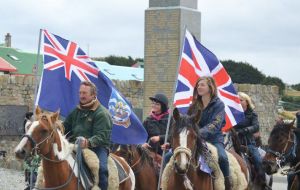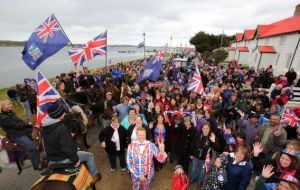MercoPress. South Atlantic News Agency
Falklands: Argentina wants to silence referendum results and applies a ‘diplomacy of desperation’
 MLA Gavin Short: Argentina’s position disappointing though not surprising
MLA Gavin Short: Argentina’s position disappointing though not surprising  Falkland Islanders parade next to the Liberation monument (from Argentina) in Stanley
Falkland Islanders parade next to the Liberation monument (from Argentina) in Stanley  To celebrate the results of the referendum Falkland Islanders pack main street
To celebrate the results of the referendum Falkland Islanders pack main street The Falkland Islands said that Argentina’s ‘frantic efforts’ to have the international community ignore the voice of the people of the Falkland Islands is ‘a diplomacy of desperation’ and insisted that the recent referendum results again confirmed that the people of the Falklands have no desire to be governed by Buenos Aires.
The statement from the Falklands elected Legislative Assembly was in response to Monday’s presentation by Argentina before the UN arguing that the referendum was ‘illegal’.
Speaking for the Legislative Assembly, MLA Gavin Short said that “it is disappointing, though not surprising, that (Foreign Minister Hector) Timerman seems so anxious to discredit our referendum. Suggestions by the Argentine Government that our referendum was “illegal” and that it contravenes UN resolutions, or that the Falkland Islanders are proscribed by the UN from discussions on the future of our Island home, are all absurd and untrue: Mr Timerman frantic efforts to lobby the international community to ignore our voice strikes us here as the diplomacy of desperation”.
The Falklands lawmaker said that last week two members of the Legislative Assembly, Sharon Halford and Mike Summers visited the United Nations in New York to discuss the results of the Falkland Islands referendum and to hand over a letter to the Secretary General.
“This letter reiterated that the Falkland Islands people have no wish to be governed by Argentina and that we value our constitutional links to the UK. It is a relationship founded on free choice”.
“Having spoken so clearly in our recent referendum, it is not credible for anyone to pretend either that the Falkland Islands people do not exist or that we do not have the basic human and political rights to determine our own future” said MLA Short.
He added that in a spirit of openness and a desire to engage with the international community, “our letter also invited the Chair of the UN Special Committee on Decolonisation to visit the Falklands and to see for himself that our home is not a colonial relic but a vibrant twenty-first century democracy.”
Last March 10/11 the Falklands held a referendum in which with an overwhelming turnout of 92%, a landslide 99.8% voted to remain as a British Overseas Territory. The ballot organization and process was praised by international observers.
The full text of the 14 March letter addressed to Ban Ki-Moon follows below:
Dear Secretary General,
On behalf of the Falkland Islands Government, the Hon Michael Summers and Hon Sharon Halford would like to present to you the results of the recent referendum on the future political status of the Falkland Islands.
99.8% of those who voted decided to maintain the current constitutional arrangement between the United Kingdom and the Falkland Islands Government. We believe this result is a clear and comprehensive expression of our wishes and very much hope that the United Nations will acknowledge and respect those wishes as the legitimate voice of the Falkland Islands people.
The founding principles of the United Nations Charter and General Assembly Resolution 1514 (XV) are clear on the primacy of respect for the principle of self determination for all peoples. UN General Assembly Resolution 1514 (XV) states that “All peoples have the right to self determination; by virtue of that right they freely determine their political status and freely pursue their economic, social and cultural development”. This right is not qualified, and attempts to qualify it within the United Nations have been rejected.
Though we value our links to the United Kingdom, we are our own community, free to determine our political future. The referendum result makes it clear that we have no desire to be governed by Argentina. Continued harassment of our economic development and intimidation of those who want to do business with us and invest in the Islands will not change this fact. The more Argentina presses our small community the harder will be our resolve.
Despite such pressure we, and the Government of the United Kingdom, remain willing to enter into dialogue with Argentina. Our differences should be discussed in a reasonable and constructive way. We favor co-operation and peaceful co-existence in the South Atlantic and there are many important issues that we can both usefully address together. Neither the United Nations Charter nor General Assembly Resolution 1514 (XV) support the concept of two large sovereign states negotiating away the rights of self-determination of the peoples of any territory. We therefore hope that the United Nations will agree that it is no longer credible to view this issue as primarily a dispute between the United Kingdom and Argentina, over and above the wishes of the Falkland Islanders.
The Falkland Islands are discussed annually by the Special Committee on Decolonisation at the United Nations. You recently said in your address at the 2013 opening session of the Committee that it was time for a new kind of inclusive dialogue about decolonization and that such dialogue required the constructive involvement of all concerned: the Special Committee, the administering Powers and the Non-Self-Governing Territories, working on a case-by-case-basis. We agree that the Committee must engage more constructively with communities it considers as ‘colonies’ and take their wishes into account. To that end we reiterate that we consider it unusual that despite issuing annual resolutions on the supposed ‘colonial’ nature of the Islands, neither the Special Committee nor its secretariat have ever visited the Islands in any official capacity. If the Special Committee on Decolonisation wishes to ‘engage in a new kind of dialogue’ then we consider it only right that Committee have the opportunity to see the Falkland Islands and its people in person. Therefore, the open invitation issued on 7 December 2010 and circulated at the United Nations for any current or future Chair of the Special Committee to visit the Falklands remains open.
We ask you again to acknowledge our wishes as expressed clearly and definitively by our referendum.
Yours Sincerely
Gavin Short
On behalf of the Members of the Legislative Assembly of the Falkland Islands




Top Comments
Disclaimer & comment rules-

-

-

Read all commentsArgentina doesn't need to silence that fake referendum results.
Mar 26th, 2013 - 02:14 am 0It was a failure from the start.
@1
Mar 26th, 2013 - 02:33 am 0It is their land, their voice is the only voice that counts.
You all are still pretty embarassed and angry about losing in '82. You all are responsible for that tragedy, you should get over your anger and just take care of the land you already occupy.
The real silence is about the bond case on thursday,not a peep! do I sense a deal has been done??
Mar 26th, 2013 - 02:48 am 0Commenting for this story is now closed.
If you have a Facebook account, become a fan and comment on our Facebook Page!